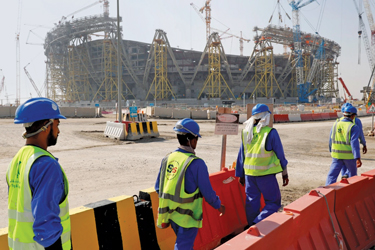UW professor joins commission on rise of modern slavery

Migrant workers in Qatar in advance of the 2022 World Cup were subject to forced labor, trapped by debt and poor working conditions.
More than 50 million people are trapped in modern slavery, according to the International Labor Organization, and forced labor and child labor exist across global supply chains. In the U.S., a New York Times investigation found unaccompanied migrant children at work in factories and meat processing plants supplying major brands. Other news articles have focused on the increased demand for cobalt (a mineral needed to make batteries for electric vehicles) mined by child laborers in the Democratic Republic of the Congo.
Calamari, which is fished and harvested at sea in Asia, is also connected to forced labor and child labor. Preparations for the 2022 World Cup drew thousands of workers to Qatar. Many had to surrender their passports to their employers, and, despite terrible working conditions and missing paychecks, they were unable to change jobs or leave the country.
Modern slavery, forced labor and sexual exploitation are a reality for millions of people all over the world. Today, in the wake of armed conflicts, COVID-19 and climate change, the problem is on the rise. In response, a new Global Commission on Modern Slavery and Human Trafficking has been formed and Professor Anita Ramasastry, who has built her expertise in business and human rights, anti-corruption and sustainable development, recently joined. With a mission to restore momentum toward ending one of the greatest human rights issues of our time, the commission is made up of government officials, former and current CEOs and NGO leaders and survivors of forced labor and enslavement. Former UK Prime Minister Theresa May serves as its chair.
Ramasastry’s role in the commission includes joining a working group focused on forced labor and modern slavery in global supply chains. The group also looks at the roles that the private sector plays. The law professor says she sees significant gaps in addressing child labor and migrant labor recruitment.
“The data on forced labor is going up. Not down,” Ramasastry says. “Even if someone is recruited into a forced labor situation and then released, they are often left in debt bondage.”
Efforts to solve the problems have often been fragmented, and governments have failed to step up the pace of reform. Ramasastry hopes that innovative new economic models and financing practices will help move past these bottlenecks.
In addition to modern slavery, Ramasastry focuses her work on other human rights-related issues in the global economy and the role of business in addressing topics such as global labor rights, Indigenous Peoples’ rights and private enterprise’s connections to human rights violations during armed conflicts. She looks at a broader range of responsibilities that private companies have. “A bigger question for companies and governments is how can different regulatory models and new laws that look beyond modern slavery to examine human rights issues in supply chains can be harmonized.” she says.
Ramasastry previously served as a member and chair of the U.N. Working Group on Business and Human Rights, appointed by the U.N. Human Rights Council. She was also a commissioner on the Liechtenstein Initiative for a Financial Sector Commission on Modern Slavery and Human Trafficking, which produced a blueprint for Finance Against Slavery and Trafficking. And she chaired a drafting committee of the U.S. Uniform Law Commission which prepared a new state law on prevention of and remedies for human trafficking. Her work has helped raise awareness around human trafficking risks associated with the World Cup and is the chair of an expert advisory group on human rights relating to the FIFA World Cup hosted by the US, Canada and Mexico in 2026.